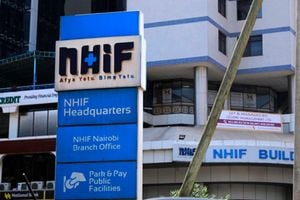Diana Lukosi: How I turned pain into widows' rights advocacy

Diana Lukosi, the founder of Wezesha Mjane Project, during an interview in Nairobi on May 17, 2023.
What you need to know:
- The mother of two founded the Wezesha Mjane Project whose primary role is to enlighten widows on inheritance, succession and compensation matters.
- The project currently has 100 widows, who engage in table-banking; every week, five members get Sh10,000 to either start or expand a business.
Diana Lukosi vividly recalls how she received the heartbreaking news of the death of her husband one afternoon in 2007. He had perished in a road accident, she was informed. They had been married for seven years.
In an interview with Nation.Africa, Diana says his untimely death left her devastated as he was the only breadwinner. And even as she mourned the father of her two children, her main worry was how she was going to bring them up alone as she had no job.
She feared and dreaded what the future held for her and the children. After her husband’s burial, she reveals that things took a more dramatic turn than expected, much to her disbelief. “I lost all his properties, including land and businesses. I also lost compensation from where he worked and from an insurance company.”
Diana says she was still young, and coupled with lack of information on succession, she ended up losing everything she was supposed to inherit from her husband.
“To be frank, I did not know anything about succession. I was not aware that after the death of my husband I was supposed to lodge a succession case in court. I was only a 29-year-old housewife who knew nothing much when my husband died. Those who shortchanged me took advantage of my ignorance,” she says.
From her painful experience, Diana learnt of what many other widows were facing.
Similar plight
This realisation, she says, led her to start an initiative that would empower widows and educate them on how to undertake succession successfully. This is how the Wezesha Mjane Project came to be. The project’s primary role is to enlighten widows on inheritance, succession and compensation matters.
“Many widows do not know where to start and where to go to secure and inherit properties left by their husbands. This normally makes them vulnerable to swindling by relatives and in-laws,” she adds.
The Wezesha Mjane project currently has 100 widows. They engage in table-banking. Every week, five members get Sh10,000 each to either start or expand a business. She singles out lack of access to credit as one the major challenges facing widows. Diana says most of them lack the funds or resources to actualise their business ideas or expand their ventures.
Wezesha Mjane project is also offering training and support for business startups for widows to enhance capacity building and financial literacy. The members can now produce and sell cakes, juice, crisps and chips, clothing, peanut butter, sweaters and hay.
And even though she is thankful to the government for setting up a widows’ fund, Diana says accessing the money remains a major challenge. She says many members of her group who have applied for the Thamini Loans have yet to benefit.
Last year, the government launched a special loan product for widows. It was launched by the Women Enterprise Fund (WEF) in a move to address the plight of millions of widows.
Thamini is tailored to provide interest-free group loans with no administrative costs. Beneficiaries must be in a registered self-help group with at least 10 members. Its membership must be 100 per cent women, with at least 70 per cent being widows. The group must have existed for at least three months.
Benefitting groups are required to have an account in a bank, Sacco or in a deposit-taking microfinance. They are also trained in specialised and holistic business management by the WEF officers as a prerequisite for the loan application. They get a one-month grace period before repayment begins.
To ensure widows reap maximum benefits from the government, Diana is proposing the formation of an independent widows’ fund that is not attached to WEF. She argues that autonomy would make the fund effective and ease access.
Kenya has about four million widows, according to the 2019 census. UN Women estimates that there are over 250 million widows globally, with one in 10 facing discrimination and extreme poverty, along with their families.
To further tackle the plight of widows, Diana last month founded Kenya Fund for Widows (KFW), aimed at strengthening their table-banking initiative. It is also aimed atimproving the lives of widows through socioeconomic empowerment, access to basic education and needs for their children, advocating their human rights, and undertaking sustainable solutions to help build resilience.
The initiative is in addition earmarked to help them expand markets for products from their tailoring industry, including school uniforms, aprons, dust coats, sweaters, socks, schoolbags, hair wigs, and hair extensions. These, Diana says, are just but a tip of the iceberg of the initiatives that she has in mind to help uplift the welfare of widows.
She appeals to Kenyans of goodwill to support her cause to help empower more widows. “Widows also matter, as they are human beings just like the others. We all need to support initiatives that are geared towards their empowerment. They are our sisters, mothers and daughters, hence the need to safeguard their human rights,” she adds.
One in 10 African women above the age of 14 is widowed, according to a 2018 World Bank Report. Most of them struggle with serious economic constraints, especially if the husbands were the sole breadwinners for their families. Rural widows in Kenya are particularly disadvantaged by patriarchy, harmful cultural practices and poverty.




